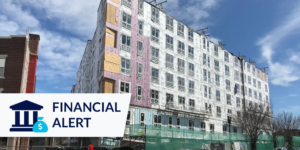
After a flood left a brand-new Quincy, Massachusetts apartment building with over $250,000 in damage — and sent its new tenants back to hotel rooms before they could even move in — subcontractor Wellington Plumbing & Heating is facing legal judgment for the incident.
Not only is Wellington in the center of the storm surrounding the water damage at the Hancock Nova residences, but the project has been at the center of lawsuits, liens, and more.
Insurance company Valley Forge Insurance alleges in their March 31, 2021 complaint that the September 2019 flood at the Hancock Nova resulted from Wellington failing to secure a plumbing line in the building.
Additionally, they claim Wellington did not procure insurance that would cover them per their contract, leading to Valley Forge seeking a judgment against Wellington for the $268,000 in damages to the building they had to pay out as a result of the insurance claim made by the building’s general contractor, D.F. Pray.
According to the legal complaint, Wellington “failed to properly secure a connection of plumbing lines, as required, thereby allowing the lines to separate,” resulting in “substantial damage” after the lines separated on September 23, 2019.
D.F. Pray filed an insurance claim with Valley Forge to cover the damage, but the insurance company now demands this claim amount be repaid from Wellington.
“Wellington breached the agreement by failing to indemnify DF Pray for the Incident and resulting damages, and failing to secure insurance that would respond and cover the Incident and resulting damage,” Valley Forge’s claim states. “Wellington further breached the agreement by failing to properly perform its work.”
Hancock Nova faced multiple legal actions
Aside from the dispute over the September 2019 floor, the project owner (known officially as Hancock Q Plaza, LLC) was the Defendant in five legal cases related to its construction and materials — all but one of which have been voluntarily dismissed. In the surviving claim from D.F. Pray, the general contractor seeks to collect on outstanding invoices totaling $1.1 million.
According to the court documents, Pray brought six counts against Hancock Q Plaza: two counts of breach of contract, a mechanics lien for work done on the Nova Suites, “breach of the covenant of faith and good dealing,” quantum meruit, “third party beneficiary,” “Chapter 93A violation,” and “declaratory relief/specific performance.” As of a ruling on February 8, 2021, all counts have been stayed pending the results of arbitration except the first count of breach of contract, which was dismissed.
Hancock Q Plaza is also currently facing a lawsuit from a tenant. The suit, over “Landlord interference with quiet enjoyment,” was filed in August of 2020 and is currently in progress.
Prefab apartment experienced multiple construction pitfalls
The work performed on the Hancock Nova was notable for its prefabricated modular construction. The residences made headlines when, despite their prefab design saving time and money on construction being a selling point, the tower faced delays that impacted move-in even before the flood occurred.
As the The Patriot Ledger reported in 2019, “The top five floors of the 171-story apartment building are made of 140 prefabricated modular boxes, a first for residential construction in Quincy, and a technique that has the potential to both cut costs and save time.”
“Cabinets, floors, faucets, closet doors, and countertops — everything was already installed. When the boxes got to the construction site, they just needed to be lifted by a crane and set into place, a process that allowed the seven-story building to rise over Quincy Center in just seven weeks,” The Patriot Ledger reported.
But the speed of construction soon came with pitfalls: 80 tenants were already forced to stay in hotel rooms when the building missed its first move-in date of completion after multiple delays including with electricity installation — and with the additional plumbing damage, what was supposed to be a quick and fast construction process kept residents away even longer, costing the project owners not only for damage repairs and fast-tracked electrical installation, but for housing tenants in a hotel during the move-in delays.
This falls in the middle of a prefab boom across the industry — modular construction is one of the 10 reported construction industry trends of 2021.
“Modular construction and prefab building, which was already steadily on the rise, should see a huge boost in interest in the post-pandemic era,” reported architect Chris Poche. “Both the manufacturing process and the result are perfectly suited for the times.”
However, due to the nature of materials, rooms, and even entire buildings being constructed “off-site,” protecting payment rights on prefabricated projects can get complicated for contractors and suppliers. Projects like the Quincy Hancock Nova residence underline that implementing modular and prefabricated construction isn’t always seamless — or risk-free.